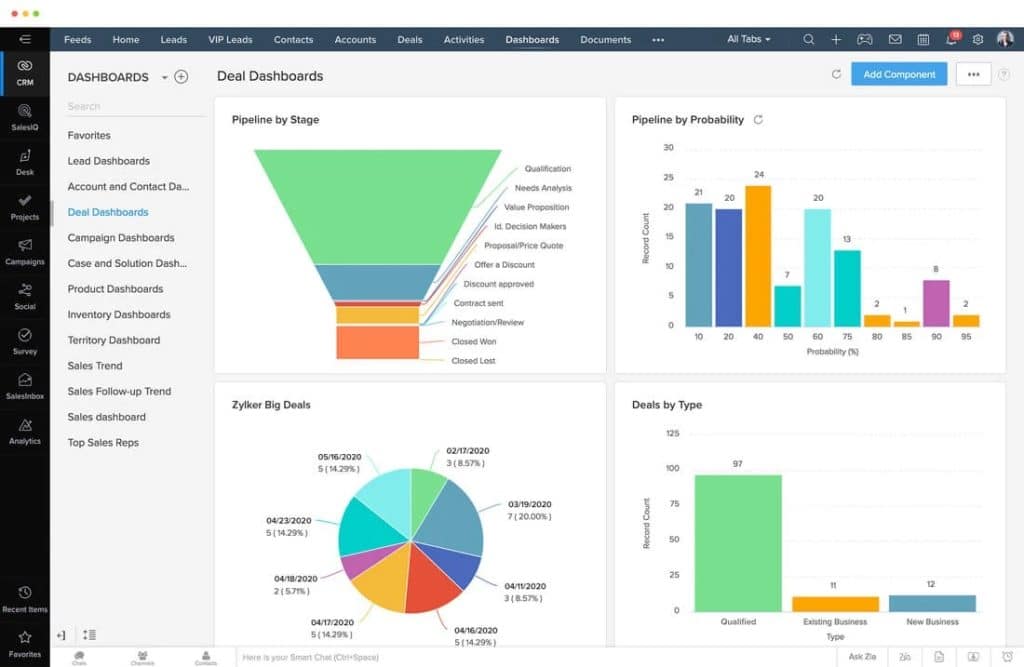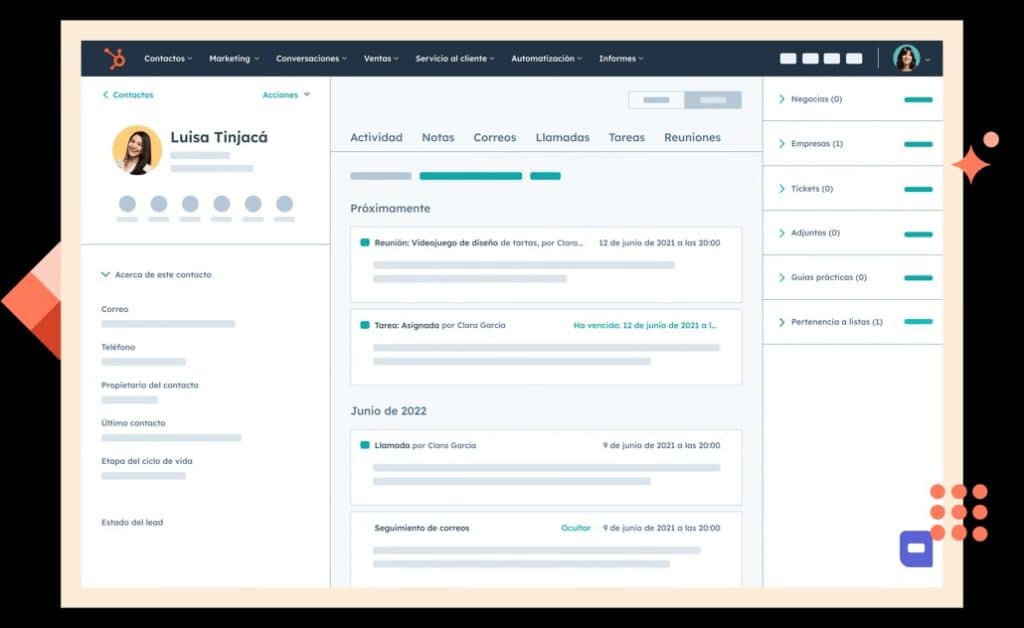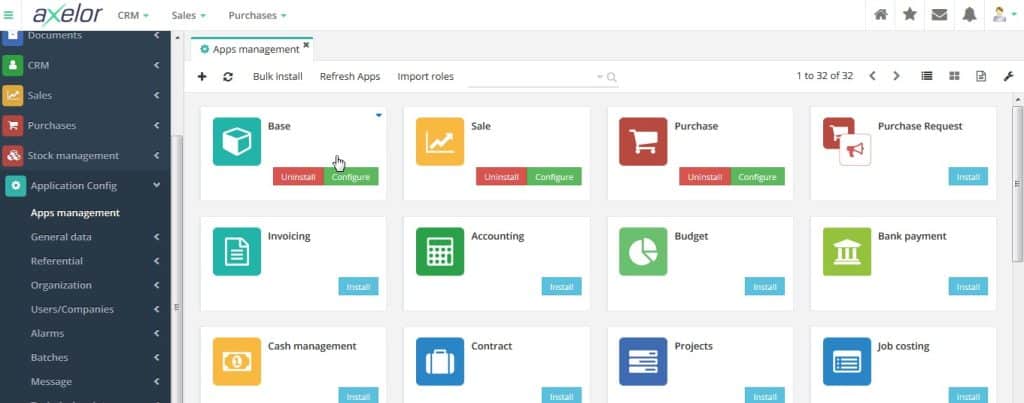A CRM, or Customer Relationship Management , is a tool designed to centralize and organize all aspects of the interaction between a company and its customers. In simple terms, a CRM allows you to manage data, relationships, and business processes, making a company's daily operations more efficient.
What are the best CRMs in Argentina?
Zoho CRM
It is a comprehensive solution that helps companies manage their customer relationships. It offers tools for sales automation, marketing, customer support and analysis.

CRM Pilot
Although not as well-known, CRM Pilot focuses on simplicity and efficiency, providing basic functionalities for customer and sales management.
HubSpot CRM
It is a free platform that offers tools for marketing, sales, and customer service. It is known for its ease of use and its integration with other HubSpot tools.

Salesforce CRM
One of the most popular and robust CRM platforms on the market, offering a wide range of functionalities for sales, customer service, marketing, and more.
SugarCRM
This CRM is known for its flexibility and customizability. It is ideal for companies that need a solution that can be adapted to their specific processes.
Monday CRM
Part of the Monday.com platform, this CRM focuses on sales pipeline visibility and team productivity. It is highly visual and easy to use.
Apollo CRM
Apollo combines sales and marketing tools into a single platform, helping businesses manage their customer relationships more efficiently.
Apsis
Apsis offers marketing and CRM solutions, focusing on automation and personalization to improve customer relationships.
Axelor
It is an open source platform that combines CRM, ERP and BPM. It is highly customizable and suitable for companies looking for an integrated solution.

Nexus CRM
Nexus specializes in customer relationship management, offering tools for sales tracking, contact management and data analysis.
What are the benefits of implementing a CRM in Argentina ?
Implementing a CRM in Argentina offers a series of benefits that directly impact the efficiency and productivity of the organization.
Here are some of the most notable ones:
- Faster responses : By centralizing all communication channels, a CRM facilitates quick responses to customers, improving their experience and increasing the chances of closing a sale.
- Increased productivity : By automating repetitive tasks, such as managing emails or creating budgets, your team can focus on more strategic activities, improving overall productivity.
- Better internal communication : By having all data accessible on a single platform, different departments can collaborate more efficiently, sharing information in real time.
- Customer loyalty : A CRM allows you to build closer and longer-lasting relationships with your customers, providing them with personalized treatment based on their preferences and previous interactions.
- Informed decision making : With the metrics and analytics CRM provides, businesses can make data-driven decisions, improving strategic planning.
How does a CRM work?
The operation of a CRM in Argentina is quite simple to understand, since it divides its functions into two key stages: pre-sale and post-sale.
- Pre-sales : CRM is responsible for tracking potential customer interactions, such as social media searches or mentions on websites. This data is captured and organized in a database, allowing for accurate lead tracking. The system will remind you of key moments to contact the customer and provide you with a detailed history of interactions to facilitate an effective and personalized conversation.
- After sales : Once the sale is complete, the focus shifts to customer loyalty. CRM stores valuable information about their purchases, preferences and problems, allowing you to offer personalized promotions and follow up in case problems arise. This ability to provide continuous and personalized treatment significantly improves the relationship with customers.
Structure of a CRM
Despite the variations between different types of CRM , they all share a basic structure consisting of three essential layers:
- Data Collection : CRM collects all relevant information about customers, from initial interactions to more specific details such as purchase history and preferences.
- Data management : Once data is collected, CRM organizes and classifies it to make it accessible. This facilitates the creation of customer databases, contact lists, and market segmentation.
- Data Analysis : Finally, CRM uses the stored information to generate reports and analyses that enable the company to make informed decisions. These analyses include metrics on customer behavior, satisfaction, and opportunities for improvement.
What are the main functions of a CRM?
To better understand how a CRM in Argentina can adapt to your company, let's look at some of its key features:
- Contact management : CRM allows you to keep an organized list of your contacts, dividing them according to their position in the sales funnel. This feature is crucial for prospecting customers and allows for detailed tracking of each lead.
- Marketing : CRM not only manages sales, it is also a powerful tool for marketing campaigns. You can design digital marketing strategies, create email campaigns and generate personalized content (smart content) that fits the characteristics of each potential client.
- Sales : With CRM, the sales team can effectively track the status of each customer within the sales process. It also enables automation of tedious tasks such as creating quotes and estimates, and helps salespeople achieve their goals by planning sales targets.
- Document management and communication : CRM makes it easier to organize documents and improve internal communication. With features like email sequence templates and internal chat, workflow within the company is more efficient, allowing teams to collaborate more quickly.
- Reporting and Metrics : Data analysis is one of the biggest benefits of a CRM. You can access key metrics such as customer satisfaction indicators, digital marketing metrics, and sales reports. This data allows you to adjust your strategies and continuously improve.
What are the prices of a CRM in Argentina?
CRM prices in Argentina vary significantly depending on the provider and the features they offer, but some average ranges can be identified to help companies plan their investment.
In general, the average cost of a CRM in the local market ranges between $10 USD and $65 USD per user per month , depending on whether you opt for more basic or complete solutions.
For example, Zoho CRM offers one of the most affordable plans, starting at $12 USD per user per month , while HubSpot CRM stands out for its free plan, ideal for small businesses that are just starting to manage their customer relationships.
However, paid plans from HubSpot and other popular CRMs like Salesforce and Microsoft Dynamics often come with higher costs, with prices that can exceed $50 USD per user per month .
Leave a Reply